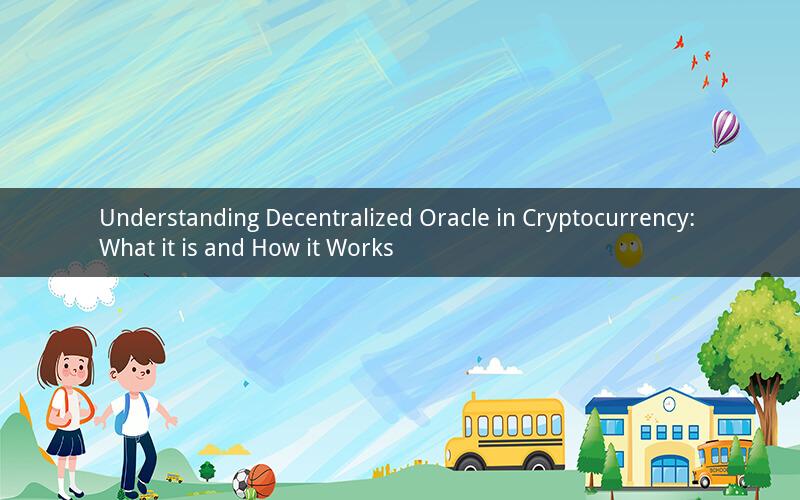
In the rapidly evolving world of cryptocurrency, decentralized oracles play a crucial role in connecting blockchain networks with real-world data. But what exactly is a decentralized oracle, and how does it work? This article delves into the concept of decentralized oracles, their significance in the crypto space, and the potential implications they hold for the future.
Decentralized Oracle: A Brief Definition
A decentralized oracle is a system that facilitates the transfer of real-world data to blockchain networks. Unlike traditional oracles, which are centralized and controlled by a single entity, decentralized oracles are powered by a network of nodes, ensuring transparency, security, and reliability. These nodes collect, validate, and disseminate data from various sources, enabling smart contracts to interact with real-world information.
The Significance of Decentralized Oracles in Cryptocurrency
1. Facilitating Smart Contracts
One of the primary uses of decentralized oracles is to provide data to smart contracts. Smart contracts are self-executing contracts with the terms of the agreement directly written into lines of code. They are designed to automate processes, reduce costs, and eliminate the need for intermediaries. However, smart contracts require real-world data to function effectively. Decentralized oracles serve as a gateway for this data, enabling smart contracts to make informed decisions based on real-world events.
2. Enhancing Transparency
In the cryptocurrency world, transparency is crucial. Decentralized oracles ensure that the data used by blockchain networks is verifiable and tamper-proof. By relying on a network of nodes rather than a single entity, decentralized oracles reduce the risk of manipulation and increase trust in the system.
3. Expanding Use Cases
Decentralized oracles open up a world of possibilities for blockchain applications. From decentralized finance (DeFi) to supply chain management, these oracles can be used to create innovative solutions that bridge the gap between real-world data and blockchain networks.
How Decentralized Oracles Work
1. Data Collection
Decentralized oracles start by collecting data from various sources. These sources can include weather stations, financial exchanges, social media, and more. The goal is to gather as much relevant data as possible to ensure the accuracy of the information provided.
2. Data Validation
Once the data is collected, it must be validated to ensure its accuracy and reliability. Decentralized oracles achieve this by using consensus mechanisms, such as Proof of Authority (PoA) or Proof of Stake (PoS), to determine the validity of the data. This process helps prevent malicious actors from injecting false information into the network.
3. Data Dissemination
After the data is validated, it is disseminated to the blockchain network. This can be done through various methods, such as direct transmission or through intermediary nodes. The blockchain network then uses this data to execute smart contracts and make informed decisions.
5 Common Questions About Decentralized Oracles and Their Answers
1. Q: What is the difference between a decentralized oracle and a traditional oracle?
A: The main difference is in their structure and control. Traditional oracles are centralized and controlled by a single entity, while decentralized oracles are powered by a network of nodes, ensuring transparency and security.
2. Q: How do decentralized oracles ensure data accuracy?
A: Decentralized oracles use consensus mechanisms, such as PoA or PoS, to validate data. This process helps prevent manipulation and ensures the accuracy of the information provided.
3. Q: Can decentralized oracles be used in any industry?
A: Yes, decentralized oracles have the potential to be used in various industries, including finance, supply chain, healthcare, and more. Their ability to connect real-world data with blockchain networks makes them versatile and adaptable.
4. Q: What are the main benefits of using decentralized oracles?
A: The main benefits include enhanced transparency, security, and the ability to create innovative solutions. Decentralized oracles also reduce costs and eliminate the need for intermediaries, making them an attractive option for various applications.
5. Q: Are there any limitations to decentralized oracles?
A: While decentralized oracles offer numerous benefits, they are not without limitations. One limitation is the potential for network congestion, which can affect the speed and cost of data transmission. Additionally, the reliance on consensus mechanisms can introduce delays in data validation.
In conclusion, decentralized oracles are an essential component of the cryptocurrency ecosystem. By connecting real-world data with blockchain networks, these oracles enable smart contracts to function effectively and create innovative solutions across various industries. As the crypto space continues to evolve, decentralized oracles are poised to play an increasingly significant role in shaping the future of blockchain technology.